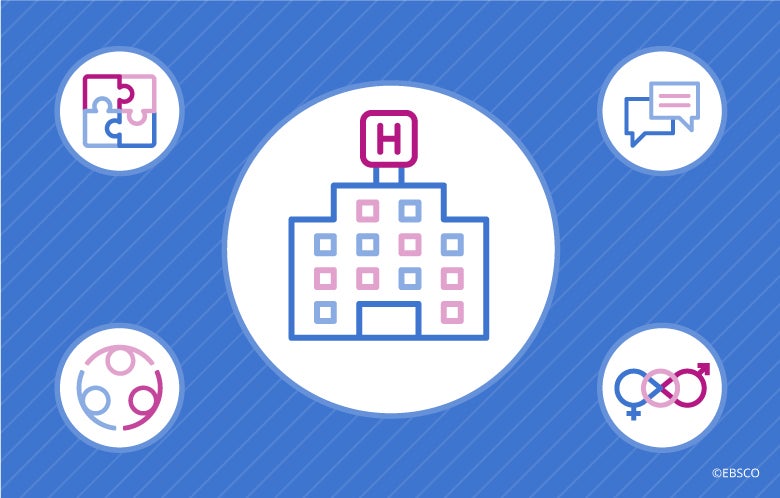As a provider of online medical research content and clinical decision support tools, EBSCO works to ensure that our health care products are accessible and meet the needs of all populations. We want to make sure that our users and customers see themselves reflected in the content provided. Whether addressing indexing standards, auditing database content, or bringing teams together to address health equity, EBSCO and its employees are dedicated to providing diverse content, equitable approaches to collection development and inclusive terminology.
CINAHL
EBSCO’s CINAHL database indexes the top nursing and allied health literature available. Nurses, allied health professionals, researchers, nurse educators and students use CINAHL to research subject areas from an authoritative index of nursing and allied health journals.
CINAHL is currently working with 14 organizations, including the American Psychological Association and Language of Gender, dedicated to the promotion and inclusion of gender and sexual diversity to guide us in using the most accurate and inclusive terminology for all audiences. The research revealed some gaps in our taxonomy and new local terminology. EBSCO is now creating additional terms for inclusion in the CINAHL thesaurus, updating current terms and adding potential future terms. CINAHL is also working with librarians worldwide to address local/regional terminology, making sure that we are reflecting local terminology such as Aboriginal Canadians, Aboriginal Australians, First Nations of Canada, and Torres Strait Islanders.
Additional Databases
In looking at other medical research databases, the Consumer Health Complete product managers are conducting a diversity audit to identify gaps in consumer health content. Researchers working on Health Library and the Patient Education Reference Center are working to add more proprietary health content on diverse people and families.
This work is ongoing, and we endeavor to identify issues and continue to address health disparity and incorporate emerging terms and issues in health care.
This work is ongoing, and we endeavor to identify issues and continue to address health disparity and incorporate emerging terms and issues in health care.
Clinical Decision Support
EBSCO’s Clinical Decisions suite offers a set of evidence-based support tools to improve patient outcomes, increase patient engagement and satisfaction, and support value-based care. These tools include DynaMed®, DynaMed Decisions™, Dynamic Health™ and DynaMed® Micromedex® with Watson™.
The Clinical Decisions team established a Health Disparities Task Force to better address issues of health equity across the product suite. The task force developed an Inclusive Style Guide to ensure the intentional use of respectful words and phrases that promote the acceptance and value of all patients. The group is collaborating with EBSCO’s Diversity, Equity and Inclusion Committee to help standardize inclusive writing principles across company products.
The Health Disparities Task Force is also engaged in the strategic expansion of DynaMed’s content to include health equity research relevant at the point-of-care. For example, DynaMed’s Systematic Literature Surveillance (SLS) group has trained specialty editors to identify and prioritize research studies and reviews about health disparities thus ensuring that the most recent evidence-base is included within the product and available to clinicians. In addition, there has been a large-scale content expansion effort with specific attention to health equity, such as the recent updating of content dedicated to transgender health and the addition of topics on issues such as medical care for people with unstable housing and racial and ethnic disparities in obstetric and gynecological care. EBSCO’s Clinical Decisions team has broadened its editorial team to include specialty topic editors with a breadth and depth of knowledge in the field of health equity and social determinants of health.
EBSCO has been working on meeting the needs of all users, no matter who they are, where they are from, or which language they speak, through natural language searching, known as equitable search. The result is a search experience that accommodates user’s natural language, which can be queried using very specific relationship types. This saves time for the researcher and allows institutions to serve the needs of all users.
This work is ongoing, and we endeavor to identify issues and continue to address important research; related to health equity at the point-of-care. Subscribe to EBSCO Health Notes to stay updated on efforts to address diversity, equity and inclusion in EBSCO resources.



